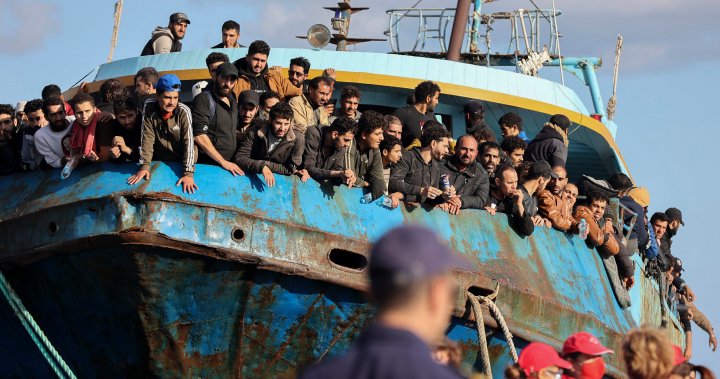The air in several major Canadian cities on Monday carries the scent of burning campfires, indicating a significant decline in air quality due to wildfire smoke. This decline can be attributed to the unprecedented fire season, exacerbated by the adverse effects of climate change. However, amidst these environmental emergencies, advocates are raising concerns about whether Canada is prepared to address the global crisis of climate migrants.
Maureen Silcoff, an immigration and refugee lawyer, points out that as climate migration increases, more people will attempt perilous journeys to reach Canada. She emphasizes the need for a broader approach to tackle this issue, considering the escalating frequency of climate change and natural disasters like earthquakes, hurricanes, fires, droughts, and floods. Silcoff criticizes Canada’s piecemeal approach, where policies are invoked on an ad hoc basis for specific disasters, and calls for a more comprehensive and bolder strategy.
One tragic incident that sheds light on climate migration is the sinking of a fishing boat off the coast of Greece on June 14. Many of those who perished in this incident were individuals from Pakistan who were trying to escape the economic crisis caused by devastating floods. The report highlights the challenges posed by climate migrants and raises questions about their status as refugees and how the climate crisis will compound the existing issues of mass migration in an unstable world.
According to a report by the UN High Commission for Refugees (UNHCR), approximately 21.5 million people are displaced each year due to extreme climate events. By 2050, the number of climate refugees could reach 1.2 billion worldwide. While Canada has increased the intake of refugees significantly, the legal definition of a “refugee” is deemed too restrictive for individuals displaced by extreme climate events. The report argues that the current Refugee Convention and Canada’s Immigration and Refugees Protection Act do not adequately address climate migration, causing difficulties for individuals from small island nations like Kiribati and Tuvalu seeking refugee status in nearby countries.
Anticipating the worst effects of climate change, experts predict that entire nations, such as the Maldives, may disappear due to rising sea levels by the end of the century. By 2050, major coastal cities like Shanghai, Mumbai, Ho Chi Minh City, Alexandria, and Bangkok could also be lost to the sea. Advocates express concerns about the inevitability of large-scale climate migration.
In light of this, the Climate Action Network Canada (CAN-Rac) penned an open letter to Prime Minister Justin Trudeau and Immigration Minister Sean Fraser, urging them to grant permanent resident status to the 1.7 million migrants in Canada as a matter of climate justice. The letter highlights the responsibility of wealthy countries like Canada for the adverse effects of climate change and emphasizes that extending equal rights to migrants is the first step towards taking accountability. It also emphasizes the valuable resilience and adaptability that climate migrants can bring to Canadian communities.
Ian Fry, the UN special rapporteur on human rights in the context of climate change, has also voiced concerns over the increasing number of people displaced across international borders due to climate change. He calls for immediate measures to provide legal protection to these individuals.
At present, Canada is grappling with its own challenges posed by climate change, including the worst wildfire season of the 21st century. The emissions linked to carbon emissions from major fossil fuel producers and cement manufacturers have contributed to the severity of these wildfires. Rising sea levels also pose a risk to Canadian cities, particularly along the Atlantic coast, the coast of the Beaufort Sea, and Metro Vancouver.
As Canadians experience the impacts of climate change firsthand, it remains to be seen whether their support for migrants fleeing climate change will grow or diminish. Silcoff hopes that Canadians will display more empathy and willingness to help, recognizing that while they may not have to flee Canada, many people around the world have no choice but to seek refuge elsewhere.
Denial of responsibility! VigourTimes is an automatic aggregator of Global media. In each content, the hyperlink to the primary source is specified. All trademarks belong to their rightful owners, and all materials to their authors. For any complaint, please reach us at – [email protected]. We will take necessary action within 24 hours.


